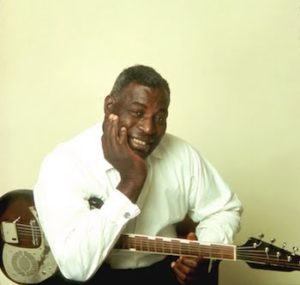
Howlin' Wolf
This date marks the birth of Howlin' Wolf in 1910. He was a Black blues singer and composer.
Chester Arthur “Howlin' Wolf” Burnett was from West Point, Mississippi. He was brought up on a cotton plantation, where he heard the region's traditional music. He started singing professionally at a young age and, in the 1920s and 1930s, played in small clubs throughout Mississippi. He was influenced by the music of Blind Lemon Jefferson, Sonny Boy Williamson, and Charley Patton.
In the 1940s, he went to Arkansas, where a blues tradition flourished, and he formed his group, which included James Cotton and Little Jr. Parker, who became noted blues performers in their own right. Howlin' Wolf accompanied himself on guitar and harmonica, but his main instrument was his guttural and emotionally suggestive voice, which gave the power and authenticity of his songs.
After his first record, "Moanin' at Midnight," became a hit in 1951, he relocated to Chicago. Along with Muddy Waters, he helped make the city a center for transforming the acoustic Mississippi Delta blues style into an electronically amplified one for urban audiences. Only blues audiences were familiar with his work until the Rolling Stones and other British and white American rock stars of the 1960s and '70s acknowledged his influence.
Howlin' Wolf was noted for his brooding lyrics and earthy, aggressive stage presence. He was one of the principal exponents of Chicago's urban blues style. Howlin’ Wolf died on January 10, 1976, in Hines, Illinois.
Nothing But the Blues The Music and the Musicians
Edited by Lawrence Cohn
Copyright 1993 Abbeville Publishing Group, New York
ISBN 1-55859-271-7